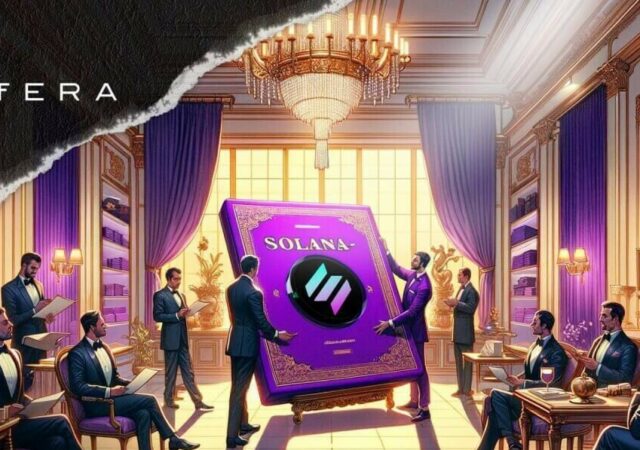- Ocean Mining grants miners autonomy to process Bitcoin blocks with non-financial transactions, reshaping the mining landscape.
- The new policy options prioritize legitimate financial transactions, balance Core principles with filtering, or align with existing mining pool practices.
- The growing popularity of Ordinal inscriptions prompts reconsideration of their role in the Bitcoin ecosystem.
Ocean Mining, a prominent mining pool, has recently made an announcement that has the potential to reshape Bitcoin mining. Challenging the conventional approach to Ordinal inscriptions, Ocean Mining now allows miners to exercise autonomy in processing Bitcoin blocks that include non-financial transactions. This policy update represents a notable departure from the pool’s previous restrictions and signifies a move towards decentralization and enhanced control for miners. In this article, we will delve into the implications of Ocean Mining’s decision and examine how it could impact the Bitcoin ecosystem.
Ocean Mining’s Flexible Block Template Policies
Ocean Mining’s new policy empowers miners by offering them three block template policy options. This move aims to facilitate decentralized block template construction and allow miners to have a greater say in the transactions they include in the blocks they mine. Let’s delve into the three policy options:
1. Ocean Recommended: Prioritizing Legitimate Financial Transactions
Ocean Mining’s recommended policy focuses on prioritizing “real” financial transactions while minimizing spam. By emphasizing the inclusion of legitimate financial transactions, this policy aims to ensure the integrity and efficiency of the Bitcoin network.
2. Bitcoin Core with “Ordisrespector” Spam Filter: Balancing Core Principles and Filtering
Miners who opt for this policy align themselves with the Bitcoin Core principles while incorporating a spam filter known as “Ordisrespector.” This filter enables the identification and exclusion of Ordinal inscriptions, which have been a subject of controversy within the Bitcoin community. By striking a balance between adhering to Core principles and implementing filtering mechanisms, miners can navigate the evolving landscape of Bitcoin mining.
3. Unmodified Bitcoin Core: Reflecting the Conventions of Other Pools
The third policy option offered by Ocean Mining mirrors the practices followed by other mining pools. This policy tends to include fewer financial transactions and a higher volume of what is referred to as “spam” in the Bitcoin ecosystem. In this context, “spam” encompasses both Ordinal inscriptions and BRC-20 token transactions. Miners opting for this policy prioritize inclusivity and maintain consistency with the practices of other pools.
Luke Dashjr’s Response: A Conciliatory Gesture?
Luke Dashjr, a prominent Bitcoin Core developer and critic of Ordinal inscriptions, responded to Ocean Mining’s announcement with a simple “Merry Christmas” on Twitter. This response has sparked various interpretations within the Bitcoin community. Some view it as a conciliatory gesture, suggesting that Dashjr may have softened his stance on Ordinals. Others perceive it as a more nuanced response, signaling an acknowledgment of the situation rather than wholehearted acceptance. The true implications of Dashjr’s response remain open to speculation and interpretation.
The Growing Popularity of Ordinal Inscriptions
Ordinal inscriptions, similar to NFTs, have gained significant traction within the Bitcoin ecosystem. Since their introduction in January, over 50 million inscriptions have been made, including those tied to BRC-20 tokens. This surge in popularity has also led to the emergence of meme coins leveraging the Bitcoin platform. The demand for incorporating Ordinals into the Bitcoin landscape has grown substantially, prompting a reconsideration of their role within the cryptocurrency ecosystem.
Ocean Mining’s Motivation and Industry Recognition
Ocean Mining’s decision to adapt its mining policies aligns with the changing dynamics of the Bitcoin ecosystem and the growing recognition of Ordinal inscriptions. The recent successful seed round of $6.2 million, led by influential figures like Jack Dorsey, highlights the industry’s acknowledgment of the potential value and impact of Ordinals. This backing signifies a broader recognition of Ordinals as legitimate digital assets within the Bitcoin blockchain. Ocean Mining’s policy update reflects the company’s commitment to remaining at the forefront of these developments.
Conclusion
Ocean Mining’s introduction of flexible block template policies marks a significant milestone in the evolution of Bitcoin mining. By granting miners the autonomy to decide whether to process blocks containing non-financial transactions, Ocean Mining embraces decentralization and empowers miners to have greater control over the transactions they include. The implications of this decision, coupled with the growing popularity of Ordinal inscriptions, are poised to shape the future trajectory of the Bitcoin ecosystem. As the Ordinals landscape continues to evolve, the impact of Ocean Mining’s policy update will become more apparent, further cementing the importance of adaptability and resilience within the cryptocurrency ecosystem.
Disclaimer
The information provided in this article is for informational purposes only and should not be considered financial advice. The article does not offer sufficient information to make investment decisions, nor does it constitute an offer, recommendation, or solicitation to buy or sell any financial instrument. The content is opinion of the author and does not reflect any view or suggestion or any kind of advise from CryptoNewsBytes.com. The author declares he does not hold any of the above mentioned tokens or received any incentive from any company.
image source





